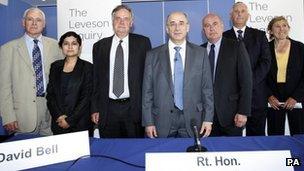Leveson inquiry: Lawyer for NoW publisher makes apology
- Published
News International lawyer Rhodri Davies QC: "Phone hacking was wrong. It was shameful"
A barrister for the News of the World's former publisher has apologised again for its "shameful" phone hacking.
News International's lawyer Rhodri Davies QC appeared before Lord Justice Leveson's inquiry into media practices and ethics, being held in London.
It was set up after it emerged that phone hacking at the News of the World was more widespread than first thought.
A barrister for Associated Newspapers has told the inquiry it is not aware of its staff engaging in the practice.
Lord Justice Leveson is examining the "culture, practices and ethics of the press" and considering whether media self-regulation works.
In his evidence for News International, Mr Davies said: "Phone hacking was wrong, it was shameful, it should never have happened."
Mr Davies said it was right that he repeated an apology by News International to the victims of phone hacking and their families at the beginning of the inquiry.
He said the company also regarded as "wholly unacceptable" the commissioning of a private investigator to operate a surveillance operation on lawyers acting for phone-hacking victims and members of a select committee.
"It wasn't journalism at all and it was unacceptable."
He said nothing said at the inquiry should detract from the company's apology in any way.
'Plumb the depths'
Mr Davies said News International accepted that the practice of phone hacking went further than just one rogue reporter, that there was no public interest justification for it and that it had not been thoroughly investigated until the police launched Operation Weeting earlier this year.
He said the company had taken several steps in response to evidence of the practice, including closing the News of the World (NoW) in July 2011, establishing a management and standards committee with an independent chairman and appointing a new chief executive.
Mr Davies stressed that News International had "several horses in its stable", and not all of its reporters or all of its papers were involved in the illegal accessing of phones.
He questioned inquiry counsel Robert Jay QC's statement on Monday that 28 NoW journalists were linked to phone hacking in notebooks belonging to private investigator Glenn Mulcaire.
Mulcaire and then NoW royal editor Clive Goodman were jailed in 2007 after admitting intercepting voicemail messages on royal aides' phones.
Mr Davies said News International knew that the names of five NoW journalists - including Goodman - appeared linked to 2,666 taskings: "2,666 taskings is 2,666 too many. Five names is five names too many."
Mr Davies said he could offer no guarantee that phone hacking by NoW had not continued beyond 2007 but that he believed the jailing of Goodman and Mulcaire had a "salutary" effect and that it was not a "thriving cottage industry" after that time.
He said the NoW had "managed to plumb the depths and heights" of journalism, with the depths illustrated by phone hacking and the heights including exposing the cricket match-fixing scandal.
'Ears of the public'
Jonathan Caplan QC submitted evidence to the inquiry on behalf of Associated Newspapers, which owns the Daily Mail, Mail on Sunday, Evening Standard, London Metro and Ireland on Sunday.
Mr Caplan said Britain needed a "strong ethical and viable press which is equipped for the significant challenge of being both the eyes and ears of the public and ultimately its voice".

Lord Justice Leveson is being assisted by a panel of six advisers
"With news and investigative journalism, those stories are not plucked full-grown from the trees," he said, adding that resources were needed to investigate stories and establish truth and accuracy.
But Mr Caplan said Associated Newspapers was unaware of any of its staff using phone hacking as a tool or bribing the police.
"We are anxious that the allegations of phone hacking should not be allowed to besmirch the profession as a whole," he said.
Mr Caplan said press standards had vastly improved over the last 20 years under the Press Complaints Commission and its editors' code of practice.
He said through the commission, complaints were heard and resolved quickly, free of charge, and without the use of lawyers and that it needed to be strengthened rather than replaced.
Self-regulation
However, Mr Caplan said Associated Newspapers believed improvements could be made by using an industry ombudsman and more prominence should be given by the press to corrections.
He stressed that all newspaper proprietors and publishers needed to be engaged in a self-regulation scheme.
"It is unacceptable that any newspaper owner should be permitted to opt out of self-regulation."
James Dingemans QC for Northern and Shell, which owns the Daily Express and Star newspapers and has opted out of the PCC scheme, said the inquiry should look at regulation of the press elsewhere in the world.
He said the company wanted a regulatory system which was entirely voluntary.
In his opening remarks on Monday, Lord Justice Leveson said freedom of the press was fundamental and his inquiry was about "who guards the guardians".
Live video of all the inquiry sessions are being streamed on the inquiry's website, external.
After the conclusion of the police investigation into NoW phone hacking, and any resultant prosecutions, a second phase of the inquiry will examine the extent of unlawful conduct by the press, and the police's initial hacking investigation.